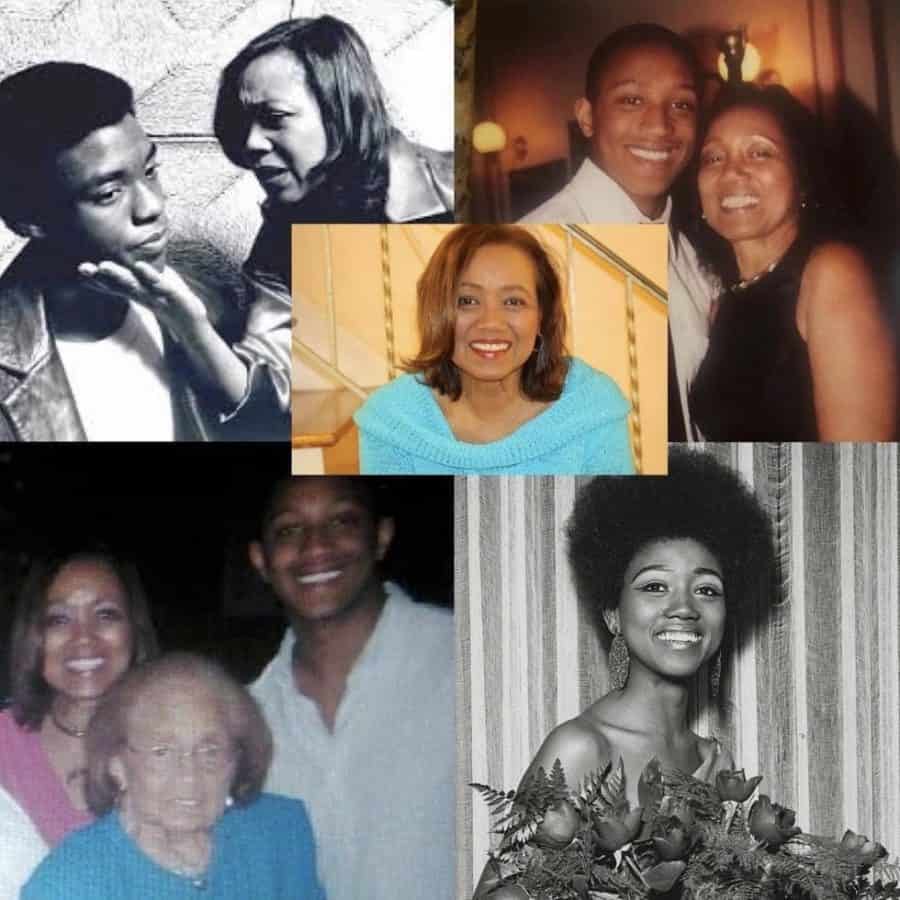First Black Bama Belle leaves behind an impactful legacy
In the upper left, Chadwick Boseman performs opposite Dianne Kirksey-Floyd in a 2002 production of “Urban Transition: Loose Blossoms.” In the upper right, Kirksey-Floyd is pictured with her son, Malcolm-Wiley Floyd. In the bottom left, Dianne poses with her son and her mother, Gladys Moore Kirksey. Photos courtesy of the Kirksey family.
September 13, 2020
Born in Eutaw, Alabama, in 1950, Dianne Kirksey-Floyd grew up in the middle of the Civil Rights Movement – a time plagued by discrimination and segregation against Black people. Cognizant of and undeterred by these realities, Kirksey-Floyd became a child activist who marched in the face of violence and death threats.
“Some things were literally too dangerous for the adults to do, but she understood that was her role in the fight,” Malcolm-Wiley Floyd, Kirksey-Floyd’s son, said.
As a child, she was creative and had a passion for the arts, so she majored in theatre and English and became heavily involved on campus. She became a trailblazer. She was the first Black Bama Belle and the first Black member of the Homecoming Court. Kirksey-Floyd also founded the African American Association, now called the Black Student Union, to create a more family-oriented environment on campus.
Her involvement and impact on campus led her to be awarded multiple times – most recently as one of 20 female trailblazers at the 125 years of women celebration. Subsequently, the University’s National Alumni Association created the Dianne Kirksey Endowed Scholarship to honor her life and achievements.
By breaking barriers at the newly desegregated University of Alabama, Kirksey-Floyd was one of the first Black students at the school whose positive influence left an impactful legacy. Her son describes her as “a force of nature.”
“She had a powerful personality and was a source of inspiration to many, but definitely to me,” he said.
As the daughter of a former educator and former superintendent, it was no secret that her family valued education.
“We come from a long line of educators and folks who value and prize education,” her son said.
Kirksey-Floyd was a very family-oriented woman who valued quality family time and made sure to never miss holidays with her family. She did not fancy flights, so she would willingly drive 19 and a half hours from New York to Tuscaloosa.
“Every vacation, every summer, every spring break we came back home,” Floyd said.
For many years, Kirksey-Floyd was an educator in New York, and she never missed an opportunity to pass on values to the next generation.
“She would make sure we would stop at interesting places so I could learn about myself and my roots,” Floyd said.
In doing so, she taught him that the “journey was part of the destination.” One of the things Floyd cherished most about his mom was her power as a storyteller.
“My mother put my story right into my name,” he said. “Malcolm is my dad’s dad and Wiley is my mom’s dad and then she even gave me Tecumseh to remember my Native American heritage, so every time I say my name, I am telling my story.”
Kirksey-Floyd’s family remembers her as a joyful and exuberant spirit. Evidently, she was the salt of the earth whose principles and convictions led her to see and manifest the best in humanity.
“One of the things I’ve been reflecting on most recently is her ability to see greatness in anybody and pull it out of them,” Floyd said. “She always wanted to help people achieve their goals and she was biased towards action in the best way.”
Kirksey-Floyd died in her New York home on September 1, 2020. Her funeral was this past Saturday, September 12, and she was laid to rest in her beloved Tuscaloosa, Alabama.















![NEWS | The University provided the UA Young Americans for Freedom chapter an exception to a required non-discrimination clause for student organization constitutions that prohibits barring membership based on characteristics of personal identity.
The exception for the conservative political organization allows it to use a modified version of the required non-discrimination statement excluding wording prohibiting discrimination based on a student’s “gender identity, gender expression, [or] sexual identity.”
“We were not about to be bullied by this new gender ideology cult infecting the University of Alabama administration,” Trenton Buffenbarger, president of UA YAF, said in an article on the YAF website.
After UA YAF applied to renew its organization with The Source, an annual requirement for student organizations, the Source rejected the application. A University employee stated in an email reply to UA YAF that it was required to include a nondiscrimination clause in its constitution with the “EXACT” wording, noting that UA YAF would remain in “frozen status” until it complied.
The chapter pushed back against this required clause, as it included references to gender identity and sexual identity.
Buffenbarger said in an interview with The Crimson White that he saw this as an attack on “basic free-thinking students,” adding he believes that welcoming in someone who not only fundamentally disagrees with the organization on “ideology,” but encourages the opposing ideology, is wrong.
“UA tried to force us to not only comply, but to explicitly put something we disagree with in writing in our constitution,” Buffenbarger said. “It is a violation of the First Amendment.”
📸 CW / Riley Thompson
🖊️ CW / Cameron Cortez
Read the full story at the link in our bio.
#theuniversityofalabama #universityofalabama #alabama #uofa #ua #crimsontide #rolltide #tuscaloosa #tuscaloosaalabama #alabama #bama](https://scontent-ord5-2.cdninstagram.com/v/t51.75761-15/482193306_18487676404025566_4501943912441479788_n.jpg?stp=dst-jpg_e35_tt6&_nc_cat=102&ccb=1-7&_nc_sid=18de74&_nc_ohc=Nw_wIF-ijs8Q7kNvgEihGiz&_nc_oc=Adl_NfJbGzA54PxeG7MNGeOKBmaUxLzaD4oEMV5MYArIk3f4gpVpvRdsE1t5bI5Y_ac&_nc_zt=23&_nc_ht=scontent-ord5-2.cdninstagram.com&edm=AM6HXa8EAAAA&_nc_gid=2tFGB0wfVlX-rEEIwTnA_g&oh=00_AYFSIvqq7WUDy4-zTUHrKWmCPAIaskZ2j5mwv4N3uIQP9Q&oe=67E08EE2)





